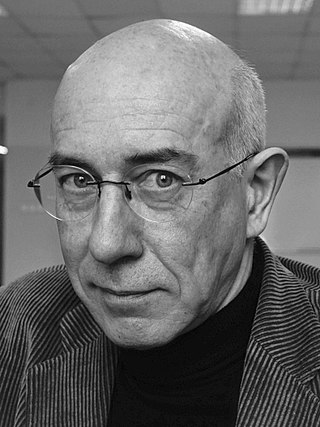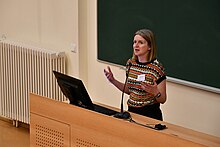
Dirk Geeraerts is a Belgian linguist. He is professor emeritus of theoretical linguistics at the University of Leuven, Belgium. He is the founder of the research unit Quantitative Lexicology and Variational Linguistics (QLVL). His main research interests involve the overlapping fields of lexical semantics, lexicology, and lexicography, with a theoretical focus on cognitive semantics. His involvement with cognitive linguistics dates from the 1980s, when in his PhD thesis he was one of the first in Europe to explore the possibilities of a prototype-theoretical model of categorization. As the founder of the journal Cognitive Linguistics and as the editor of the Oxford Handbook of Cognitive Linguistics, he played an instrumental role in the international expansion of cognitive linguistics. Geeraerts is one of the outspoken advocates of the implementation of empirical methodologies, such as corpus linguistics in cognitive linguistic research. He also argues for the involvement of more pragmatic elements such as contextual factors, lectal variation, and language history that influence the construal of word meanings and the choice of lexical items for concepts.
Hermann Moisl is a retired senior lecturer and visiting fellow in Linguistics at Newcastle University. He was educated at various institutes, including Trinity College Dublin and the University of Oxford.
Collostructional analysis is a family of methods developed by Stefan Th. Gries and Anatol Stefanowitsch. Collostructional analysis aims at measuring the degree of attraction or repulsion that words exhibit to constructions, where the notion of construction has so far been that of Goldberg's construction grammar.
Stefan Th. Gries is (full) professor of linguistics in the Department of Linguistics at the University of California, Santa Barbara (UCSB), Honorary Liebig-Professor of the Justus-Liebig-Universität Giessen, and since 1 April 2018 also Chair of English Linguistics at the Justus-Liebig-Universität Giessen.
Anna Siewierska was a Polish-born linguist who worked in Australia, Poland, the Netherlands and the United Kingdom. She was professor of linguistics at Department of Linguistics and English Language Lancaster University and a leading specialist in language typology.
Elena Semino is an Italian-born British linguist whose research involves stylistics and metaphor theory. Focusing on figurative language in a range of poetic and prose works, most recently she has worked on topics from the domains of medical humanities and health communication. Her projects use corpus linguistic methods as well as qualitative analysis.

Andrej Kibrik is a Russian linguist, the director of the Institute of Linguistics of the Russian Academy of Sciences, and professor at the Philological Faculty of the Moscow State University. Member of the Academia Europaea since 2013.
Krista De Jonge is a Belgian architectural historian and full professor of architectural history at KU Leuven.
Distributionalism was a general theory of language and a discovery procedure for establishing elements and structures of language based on observed usage. The purpose of distributionalism was to provide a scientific basis for syntax as independent of meaning. Zellig Harris defined 'distribution' as follows.
“The DISTRIBUTION of an element is the total of all environments in which it occurs, i.e. the sum of all the (different) positions of an element relative to the occurrence of other elements[.]”
Asifa Majid is a psychologist, linguist and cognitive scientist who is professor of language, communication and cultural cognition at the University of Oxford, UK. She is the 2024 recipient of the Jeffrey L. Elman Prize for Scientific Achievement and Community Building, awarded by the Cognitive Science Society. In 2015 she won the Ammodo KNAW Award for fundamental research.
Mira Ariel is a professor of linguistics at Tel Aviv University, specializing in pragmatics. A pioneer of the study of information structure, she is best known for creating and developing Accessibility Theory.
Elizabeth Couper-Kuhlen is an American linguist and distinguished professor (emeritus) from the University of Helsinki.
Aslı Özyürek is a linguist, cognitive scientist and psychologist. She is professor at the Center for Language Sciences and the Donders Institute for Brain, Cognition and Behaviour at Radboud University Nijmegen, and incoming Director of the Multimodal Language Department of the Max Planck Institute for Psycholinguistics.

Carita Paradis is a Swedish linguist, and Professor of English Language and Linguistics at Lund University.
Maria Koptjevskaja-Tamm is a Russian-born linguist and typologist who is Professor of General Linguistics at Stockholm University.
Angela Ralli is a Greek linguist, morphologist and dialectologist.
Teresa Fanego is a Spanish linguist specializing in the history of English.
Heike Behrens is a German linguist who is professor of cognitive linguistics and language acquisition at the University of Basel.
Ekaterina Vladimirovna Rakhilina is a Russian linguist and professor at the Higher School of Economics in Moscow.
Iraide Ibarretxe-Antuñano is a professor of linguistics at the University of Zaragoza known for her research in cognitive linguistics and psycholinguistics.



